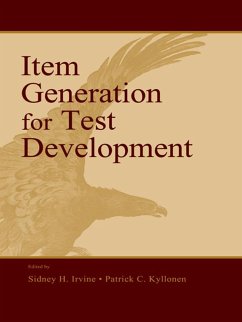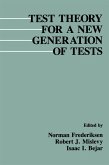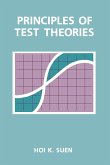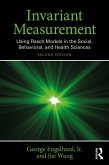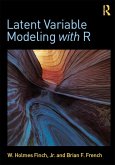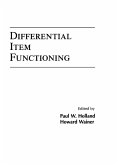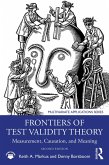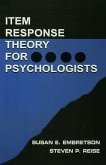Item Generation for Test Development (eBook, ePUB)
Redaktion: Irvine, Sidney H.; Kyllonen, Patrick C.
51,95 €
51,95 €
inkl. MwSt.
Sofort per Download lieferbar

26 °P sammeln
51,95 €
Als Download kaufen

51,95 €
inkl. MwSt.
Sofort per Download lieferbar

26 °P sammeln
Jetzt verschenken
Alle Infos zum eBook verschenken
51,95 €
inkl. MwSt.
Sofort per Download lieferbar
Alle Infos zum eBook verschenken

26 °P sammeln
Item Generation for Test Development (eBook, ePUB)
Redaktion: Irvine, Sidney H.; Kyllonen, Patrick C.
- Format: ePub
- Merkliste
- Auf die Merkliste
- Bewerten Bewerten
- Teilen
- Produkt teilen
- Produkterinnerung
- Produkterinnerung

Bitte loggen Sie sich zunächst in Ihr Kundenkonto ein oder registrieren Sie sich bei
bücher.de, um das eBook-Abo tolino select nutzen zu können.
Hier können Sie sich einloggen
Hier können Sie sich einloggen
Sie sind bereits eingeloggt. Klicken Sie auf 2. tolino select Abo, um fortzufahren.

Bitte loggen Sie sich zunächst in Ihr Kundenkonto ein oder registrieren Sie sich bei bücher.de, um das eBook-Abo tolino select nutzen zu können.
The major thrust of test development in the next decade will be the harnessing of item generation technology to the production of computer developed tests. This book is a compilation of papers about this presented at the ETS sympoisum in November 1998.
- Geräte: eReader
- mit Kopierschutz
- eBook Hilfe
- Größe: 18.57MB
Andere Kunden interessierten sich auch für
![Test Theory for A New Generation of Tests (eBook, ePUB) Test Theory for A New Generation of Tests (eBook, ePUB)]() Test Theory for A New Generation of Tests (eBook, ePUB)53,95 €
Test Theory for A New Generation of Tests (eBook, ePUB)53,95 €![Principles of Test Theories (eBook, ePUB) Principles of Test Theories (eBook, ePUB)]() Hoi K. SuenPrinciples of Test Theories (eBook, ePUB)50,95 €
Hoi K. SuenPrinciples of Test Theories (eBook, ePUB)50,95 €![Invariant Measurement (eBook, ePUB) Invariant Measurement (eBook, ePUB)]() George Engelhard Jr.Invariant Measurement (eBook, ePUB)54,95 €
George Engelhard Jr.Invariant Measurement (eBook, ePUB)54,95 €![Latent Variable Modeling with R (eBook, ePUB) Latent Variable Modeling with R (eBook, ePUB)]() W. Holmes FinchLatent Variable Modeling with R (eBook, ePUB)55,95 €
W. Holmes FinchLatent Variable Modeling with R (eBook, ePUB)55,95 €![Differential Item Functioning (eBook, ePUB) Differential Item Functioning (eBook, ePUB)]() Differential Item Functioning (eBook, ePUB)46,95 €
Differential Item Functioning (eBook, ePUB)46,95 €![Frontiers of Test Validity Theory (eBook, ePUB) Frontiers of Test Validity Theory (eBook, ePUB)]() Keith A. MarkusFrontiers of Test Validity Theory (eBook, ePUB)55,95 €
Keith A. MarkusFrontiers of Test Validity Theory (eBook, ePUB)55,95 €![Item Response Theory for Psychologists (eBook, ePUB) Item Response Theory for Psychologists (eBook, ePUB)]() Susan E. EmbretsonItem Response Theory for Psychologists (eBook, ePUB)60,95 €
Susan E. EmbretsonItem Response Theory for Psychologists (eBook, ePUB)60,95 €-
-
-
The major thrust of test development in the next decade will be the harnessing of item generation technology to the production of computer developed tests. This book is a compilation of papers about this presented at the ETS sympoisum in November 1998.
Dieser Download kann aus rechtlichen Gründen nur mit Rechnungsadresse in A, B, BG, CY, CZ, D, DK, EW, E, FIN, F, GR, HR, H, IRL, I, LT, L, LR, M, NL, PL, P, R, S, SLO, SK ausgeliefert werden.
Produktdetails
- Produktdetails
- Verlag: Taylor & Francis
- Seitenzahl: 444
- Erscheinungstermin: 13. Mai 2013
- Englisch
- ISBN-13: 9781135663193
- Artikelnr.: 38447899
- Verlag: Taylor & Francis
- Seitenzahl: 444
- Erscheinungstermin: 13. Mai 2013
- Englisch
- ISBN-13: 9781135663193
- Artikelnr.: 38447899
- Herstellerkennzeichnung Die Herstellerinformationen sind derzeit nicht verfügbar.
Irvine, Sidney H.; Kyllonen, Patrick C.
Contents: H. Braun
Foreword. S.H. Irvine
Item Generation for Test Development: An Introduction. Prologue and Epilogue: Remembering Samuel J. Messick. Part I:Psychometric and Cognitive Theory of Item Generation.S.H. Irvine
The Foundations of Item Generation for Mass Testing. S. Newstead
P. Bradon
S. Handley
J. Evans
I. Dennis
Using the Psychology of Reasoning to Predict the Difficulty of Analytical Reasoning Problems. I. Dennis
S. Handley
P. Bradon
J. Evans
S. Newstead
Approaches to Modeling Item-Generative Tests. L. Swanson
Discussant Remarks. Discussion. Part II:Construct-Oriented Approaches to Item Generation.R.J. Mislevy
L.S. Steinberg
R.G. Almond
On the Roles of Task Model Variables in Assessment Design. M.K. Enright
K.M. Sheehan
Modeling the Difficulty of Quantitative Reasoning Items: Implications for Item Generation. L.F. Hornke
Item-Generation Models for Higher Order Cognitive Functions. C. Lewis
Discussant Remarks. Discussion. Part III:From Theory to Implementation. I.I. Bejar
Generative Testing: From Conception to Implementation. S.E. Embretson
Generating Abstract Reasoning Items With Cognitive Theory. P.C. Kyllonen
Item Generation for Repeated Testing of Human Performance. D. Wright
Scoring Tests When Items Have Been Generated. H. Wainer
On the Automatic Generation of Test Items: Some Whens
Whys
and Hows. Part IV: Applications of Item-Generative Principles.D. Bartram
The MICROPAT Pilot Selection Battery: Applications of Generative Techniques for Item-Based and Task-Based Tests. K-M. Goeters
B. Lorenz
On the Implementation of Item Generation Principles for the Design of Aptitude Testing in Aviation. M.K. Singley
R.E. Bennett
Item Generation and Beyond: Applications of Schema Theory to Mathematics Assessment. R. Morgan
Discussant Remarks. Discussion.
Foreword. S.H. Irvine
Item Generation for Test Development: An Introduction. Prologue and Epilogue: Remembering Samuel J. Messick. Part I:Psychometric and Cognitive Theory of Item Generation.S.H. Irvine
The Foundations of Item Generation for Mass Testing. S. Newstead
P. Bradon
S. Handley
J. Evans
I. Dennis
Using the Psychology of Reasoning to Predict the Difficulty of Analytical Reasoning Problems. I. Dennis
S. Handley
P. Bradon
J. Evans
S. Newstead
Approaches to Modeling Item-Generative Tests. L. Swanson
Discussant Remarks. Discussion. Part II:Construct-Oriented Approaches to Item Generation.R.J. Mislevy
L.S. Steinberg
R.G. Almond
On the Roles of Task Model Variables in Assessment Design. M.K. Enright
K.M. Sheehan
Modeling the Difficulty of Quantitative Reasoning Items: Implications for Item Generation. L.F. Hornke
Item-Generation Models for Higher Order Cognitive Functions. C. Lewis
Discussant Remarks. Discussion. Part III:From Theory to Implementation. I.I. Bejar
Generative Testing: From Conception to Implementation. S.E. Embretson
Generating Abstract Reasoning Items With Cognitive Theory. P.C. Kyllonen
Item Generation for Repeated Testing of Human Performance. D. Wright
Scoring Tests When Items Have Been Generated. H. Wainer
On the Automatic Generation of Test Items: Some Whens
Whys
and Hows. Part IV: Applications of Item-Generative Principles.D. Bartram
The MICROPAT Pilot Selection Battery: Applications of Generative Techniques for Item-Based and Task-Based Tests. K-M. Goeters
B. Lorenz
On the Implementation of Item Generation Principles for the Design of Aptitude Testing in Aviation. M.K. Singley
R.E. Bennett
Item Generation and Beyond: Applications of Schema Theory to Mathematics Assessment. R. Morgan
Discussant Remarks. Discussion.
Contents: H. Braun
Foreword. S.H. Irvine
Item Generation for Test Development: An Introduction. Prologue and Epilogue: Remembering Samuel J. Messick. Part I:Psychometric and Cognitive Theory of Item Generation.S.H. Irvine
The Foundations of Item Generation for Mass Testing. S. Newstead
P. Bradon
S. Handley
J. Evans
I. Dennis
Using the Psychology of Reasoning to Predict the Difficulty of Analytical Reasoning Problems. I. Dennis
S. Handley
P. Bradon
J. Evans
S. Newstead
Approaches to Modeling Item-Generative Tests. L. Swanson
Discussant Remarks. Discussion. Part II:Construct-Oriented Approaches to Item Generation.R.J. Mislevy
L.S. Steinberg
R.G. Almond
On the Roles of Task Model Variables in Assessment Design. M.K. Enright
K.M. Sheehan
Modeling the Difficulty of Quantitative Reasoning Items: Implications for Item Generation. L.F. Hornke
Item-Generation Models for Higher Order Cognitive Functions. C. Lewis
Discussant Remarks. Discussion. Part III:From Theory to Implementation. I.I. Bejar
Generative Testing: From Conception to Implementation. S.E. Embretson
Generating Abstract Reasoning Items With Cognitive Theory. P.C. Kyllonen
Item Generation for Repeated Testing of Human Performance. D. Wright
Scoring Tests When Items Have Been Generated. H. Wainer
On the Automatic Generation of Test Items: Some Whens
Whys
and Hows. Part IV: Applications of Item-Generative Principles.D. Bartram
The MICROPAT Pilot Selection Battery: Applications of Generative Techniques for Item-Based and Task-Based Tests. K-M. Goeters
B. Lorenz
On the Implementation of Item Generation Principles for the Design of Aptitude Testing in Aviation. M.K. Singley
R.E. Bennett
Item Generation and Beyond: Applications of Schema Theory to Mathematics Assessment. R. Morgan
Discussant Remarks. Discussion.
Foreword. S.H. Irvine
Item Generation for Test Development: An Introduction. Prologue and Epilogue: Remembering Samuel J. Messick. Part I:Psychometric and Cognitive Theory of Item Generation.S.H. Irvine
The Foundations of Item Generation for Mass Testing. S. Newstead
P. Bradon
S. Handley
J. Evans
I. Dennis
Using the Psychology of Reasoning to Predict the Difficulty of Analytical Reasoning Problems. I. Dennis
S. Handley
P. Bradon
J. Evans
S. Newstead
Approaches to Modeling Item-Generative Tests. L. Swanson
Discussant Remarks. Discussion. Part II:Construct-Oriented Approaches to Item Generation.R.J. Mislevy
L.S. Steinberg
R.G. Almond
On the Roles of Task Model Variables in Assessment Design. M.K. Enright
K.M. Sheehan
Modeling the Difficulty of Quantitative Reasoning Items: Implications for Item Generation. L.F. Hornke
Item-Generation Models for Higher Order Cognitive Functions. C. Lewis
Discussant Remarks. Discussion. Part III:From Theory to Implementation. I.I. Bejar
Generative Testing: From Conception to Implementation. S.E. Embretson
Generating Abstract Reasoning Items With Cognitive Theory. P.C. Kyllonen
Item Generation for Repeated Testing of Human Performance. D. Wright
Scoring Tests When Items Have Been Generated. H. Wainer
On the Automatic Generation of Test Items: Some Whens
Whys
and Hows. Part IV: Applications of Item-Generative Principles.D. Bartram
The MICROPAT Pilot Selection Battery: Applications of Generative Techniques for Item-Based and Task-Based Tests. K-M. Goeters
B. Lorenz
On the Implementation of Item Generation Principles for the Design of Aptitude Testing in Aviation. M.K. Singley
R.E. Bennett
Item Generation and Beyond: Applications of Schema Theory to Mathematics Assessment. R. Morgan
Discussant Remarks. Discussion.
